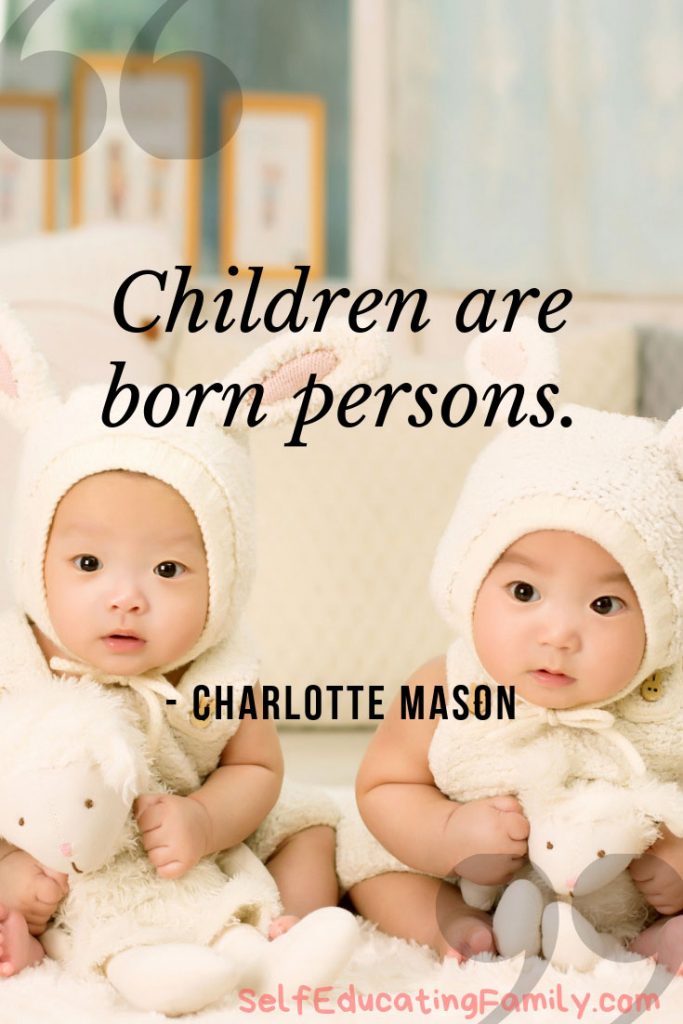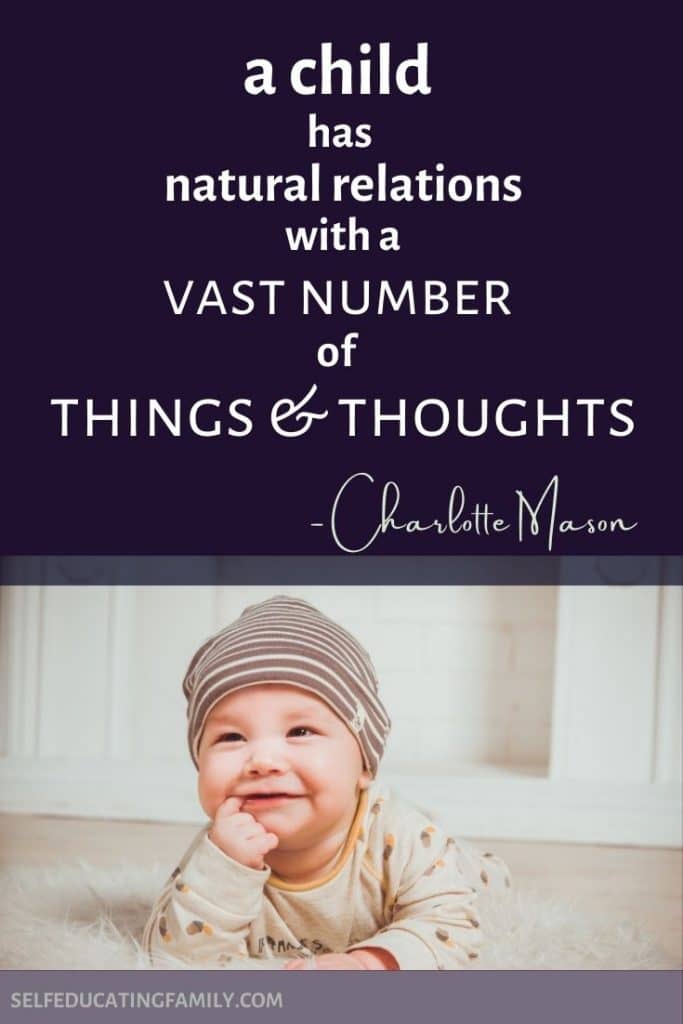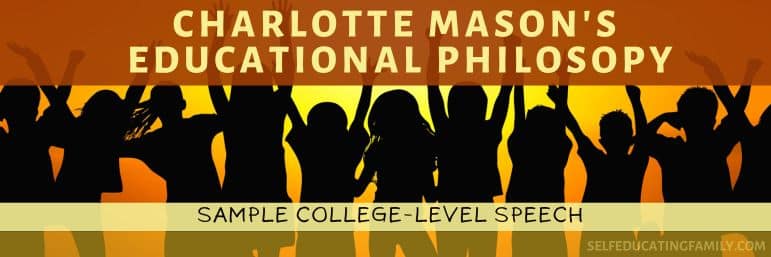Charlotte Mason Educational Philosophy
This post contains an outline of a speech on the Charlotte Mason Educational Philosophy. It’s a guest post from one of the students in our homeschool co-op.
Like my sons, the author took some community college courses for credit toward an associate degree. This post showcases a speech she gave for a college-level speech class – the speech was on the homeschooling method that she had grown up with.
Besides being a great introduction to Charlotte Mason philosophy, this speech is an excellent example of outlining.
Speech Title: Charlotte Mason’s Educational Philosophy
General Purpose: to inform
Specific Purpose: to inform my audience of Charlotte Mason’s educational philosophy.
Thesis Statement: A Charlotte Mason education revolves around the idea that children are born persons.
Organizational Pattern: Topical Organization
Introduction
- Attention getter: January marked one hundred years since an old woman died at Ambleside in the UK. That old woman was Charlotte Mason, a British educational philosopher. She founded The House of Education, a teacher’s college. Charlotte Mason’s educational philosophy is still used today.
- Reveal/introduce topic: It is based on the idea that children are born persons and thus are owed certain things in their education.
- Audience Adaptation and Relevance: This is a bit of a strange idea, so I want to explain it to you. It is very important that you understand this because we will soon be raising our own children and overseeing their education.
- Credibility: I am passionate about education. I was homeschooled for twelve years, and for eleven of those years, my family used AmblesideOnline, an internationally used and recognized Charlotte Mason curriculum. As a result, I am very familiar with how her philosophies play out practically in the day-to-day of education. I began researching Ms. Mason’s philosophies because I wanted to understand what drove the way that I was educated and why it worked so well.
- Preview: Charlotte Mason’s educational philosophy is based on the principle that children are born persons. Because of this, they are owed certain things in their education. Teachers are there to create an atmosphere where children can make their own connections. This is a very unusual philosophy nowadays, so I am going to explain it.

Body
Point I
Children are born persons.
- Children are not their own category of people.
- Nothing about being a child makes a child less of a human.
- Children are fully human.
- Therefore they are capable of learning just as an adult would.
- Karen Glass, a well-known author of several books about Charlotte Mason’s educational philosophy and methods and one of the founders of AmblesideOnline says, “because children are persons, possessing mind and personality from the very beginning, Ms. Mason urges us to develop educational methods that will be adequate to meet their needs” (Mind to Mind 19).
- Because children are persons, they are owed certain things in their education, both in the ideas given to them and how they are treated.
- They are not being trained to become a person.
- They are being taught how to create a rich inner life.
Transition:
The idea that children are born persons leads to several ideas about what learning is and how children should be taught.
Point II
Charlotte Mason says that education is about discovering the connections in the world.
- She calls education “the Science of Relations,” and says that “a child has natural relations with a vast number of things and thoughts…” She goes on to explain that we must train children in many aspects of life, physical exercise, nature, science, art, crafts, self-knowledge, and living ideas and the books they came from. (Home Education)
- There are innate connections in the world around us.
- A well-educated person should understand the way that ideas are connected to each other and how they connect to themselves.

Transition:
Because the goal of education in a Charlotte Mason education is to discover connections, the role of the teacher is different than in other methods of education.
Point III
The role of the teacher is to create an atmosphere that respects a child’s personhood and where learning can occur.
- The most important thing for a teacher to understand is that they are not responsible for a child’s learning.
- A child is a person, just like an adult is a person.
- A child is fully capable of understanding and interacting with great ideas on their own.
- Therefore, the child is responsible for his or her own learning.
- The children should make connections for themselves.
- A teacher trying to help make connections or make them for the child will only get in the way and damage the process.
- Wendi Capehart is one of the founders of AmblesideOnline. She says, “Miss Mason talks about letting the kids make their own connections. The more I step back and let this happen, the more amazed I am at how many connections the kids make that I never thought of” (An Introduction to Charlotte Mason).
- A teacher is there to bring a child into contact with great minds.
- In her book, Mind to Mind, Karen Glass says that “mind appeals to mind and thought begets thought and that is how we become educated. For this reason, we owe it to every child to put him in communication with great minds that he may get at great thoughts…” (5-6).
- This happens in many ways, through reading living books, spending time in nature, listening to great composers, and studying great art.
…we owe it to every child to put him in communication with great minds that he may get at great thoughts.
Karen Glass, Mind to Mind
- Additionally, a teacher ought not to manipulate a child into learning, either through fear or love.
- It is unethical and unfair to the child.
- It disrespects the child’s personhood.
- Teachers should not manipulate children because they are not objects.
- They are people and are capable of and responsible for their own learning.
- It will not work.
- The only way that a person will truly learn is through interest and a desire to understand connections.
- Children who are threatened or manipulated into “learning” will not retain information or understand what they are learning, which defeats the whole purpose of education.
- It is unethical and unfair to the child.
Conclusion
- Cue to close: All of the ideas behind a Charlotte Mason education boil down to treating a child as a person.
- Thesis/Summary: Because children are persons, education is about giving them a chance to make meaningful connections in order that they may have a rich inner life. Learning is accomplished only by the child. A teacher is there to bring the child in contact with great ideas so that the child may make connections for themselves.
- Close with impact: Consider this idea of the purpose and process of education. Does it seem accurate to you? If so, what are you going to do with it?
End of speech
Wasn’t that Wonderful?
I loved her speech! And I loved watching this student mature over the years. If you are not familiar with Charlotte Mason’s educational philosophy before you read this, you are now! If you are new to her ideas, keep in mind that “children are born persons” does not imply that babies have the same ability of expression or maturity level as adults. For instance, just because a child can’t express why a flower is beautiful, doesn’t mean you shouldn’t bring flowers into your home!
Keep Learning
* Disclosure: This post contains affiliate links, meaning that if you make a purchase after clicking through, SelfEducatingFamily will receive a small commission at no extra cost to you.
Works Cited
AmblesideOnline. “An Introduction to Charlotte Mason.” AmblesideOnline, https://www.amblesideonline.org/cm-intro.
Lancaster, Sarah. Personal interview. 16 Feb. 2023.
Mason, Charlotte M., and Karen Glass. “Children Are Born Persons.” Mind to Mind: An Essay towards a Philosophy of Education, Karen Glass, 2015, p. 19.
Mason, Charlotte M., and Karen Glass. “Introduction.” Mind to Mind: An Essay towards a Philosophy of Education, Karen Glass, 2015, pp. 5–6.
Mason, Charlotte Maria. “Preface to the ‘Home Education’ Series.” Home Education, K. Paul, Trench, Trübner & Co., London, 1905.
————–
